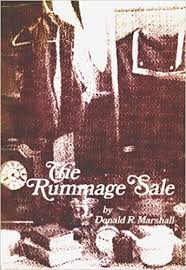Articles/Essays – Volume 08, No. 1
Intimate Portraits | Donald R. Marshall, The Rummage Sale
In that everlasting discussion on when we are going to have a Mormon literature, the anticipated writer of the great Mormon story is usually expected to be a Tolstoi or a Melville who will tell it as an epic. Now comes a fascinating book by Donald R. Marshall called The Rummage Sale. It is unquestionably Mormon and is also very good, but it is not an epic at all. It is instead a series of short stories that are rather closer to William Dean Howells or Sarah Orne Jewett.
The resulting tales come out as honest, intimate portraits of common people in small Utah towns. Instead of struggling with the great issues of truth and error or good and evil, they grapple with the problems of their own identities versus community and family expectations, with small town parochialism versus sophistication, or with the conflict of stability versus change.
One such portrait is that of Thalia Beale, a shy old maid from Ephraim, who after her mother’s death takes her savings and makes a trip to California— managing to spend a month in Pacific Grove and Carmel, pretending to herself that she is living a cultivated life before returning to the drabness of her home. (Dialogue readers will remember this story from the Autumn 1972 issue.) Another story, “All the Cats in Zanzibar,” is the journal of LaRena Homer from American Fork who takes a grand tour to the Holy Land and finds it inferior to Utah. “May the Good Lord Bless and Keep You” is the outrageous correspondence between Elder Calbert Dunkley and Floydene Wallup—a kind of Ring Lardner story with characters who are embarrassingly Mormon. “The Sound of Drums” is a story of a young man from Heber who earns a Ph.D. in the East and returns on a visit to be embarrassed at the narrowness and provinciality of his family and home town. Here, as in other stories in the volume, Marshall’s two-edged pen reveals the returnee as not only educated but also snobbish and insensitive.
Although Marshall’s characters tend to be provincial, they emerge as believable, familiar people, and their foibles are shown with no more malice than would occur in parlor talk about absent relatives held in affection.
The time of the stories is the recent present, but there is a pervading sense of past tradition and habit. The pioneer ancestors of the characters are there as ghosts in the background, and the feeling is enhanced by Marshall’s occasional photographs of old Utah homes. These help, together with a few of his poems, to give the book a sense of unity.
The style of the stories is varied, and ranges from echoes of Sinclair Lewis, J. D. Salinger, and Sherwood Anderson to a manner reminiscent of the previously mentioned Lardner, Jewett and Howells. But such comparisons are not really fair. Marshall’s own strong voice comes through constantly, and he has an uncanny ear for rural speech and an eye for significant detail in scene and artifact.
Some stories are stronger than others, but I doubt that readers will agree on which are the best. Plainly it is the best collection of stories about Mormon life that has yet appeared—another evidence of the naissance of Mormon literature.
The Rummage Sale. By Donald R. Marshall. Provo, Utah: Heirloom Publications, 1972. 141 pp. $3.75, hardback. $2.50, paperback.


 Back to full Issue
Back to full Issue

